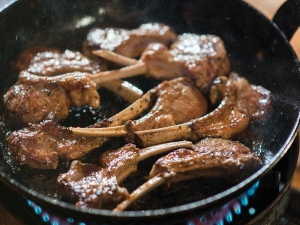NZ meat industry seeks removal of US 15% lamb tariff
Meat processors are hopeful that the additional 15% tariff on lamb exports to the US will also come off.
 Events will take place in London and Oamaru to celebrate the 140th annivesary of the first shipment of New Zealand lamb to the UK.
Events will take place in London and Oamaru to celebrate the 140th annivesary of the first shipment of New Zealand lamb to the UK.
Celebrations will be held in London and Oamaru on 24 May to mark the 140th anniversary of the first shipment of frozen New Zealand lamb arriving in the UK in 1882.
Beef + Lamb New Zealand (B+LNZ) and New Zealand Meat Board (NZMB) chair Andrew Morrison and New Zealand High Commissioner to the UK Bede Corry will speak Butchers Hall, home of the Worshipful Company of Butchers in London.
The event, which will be attended by representatives of major UK lamb customers, will feature a welcome and performance by Ngāti Rānana London Māori Club, and a New Zealand lamb barbecue.
Meanwhile, Beef + Lamb New Zealand Ltd will also mark the anniversaries with a dinner at Oamaru’s Loan and Mercantile Building.
Speakers include George Berry, former owner of Totara Estate, south of Oamaru, where the original shipment of lamb was processed before leaving Port Chalmers for London on 15 February 1882.
Berry, who with his wife Carol, owned the Totara Estate home farm for 50 years, will outline the story of the beginnings of the meat export trade, including the pioneering role of Thomas Brydone, Superintendent of the New Zealand and Australia Land Co.
Sirma Karapeeva, chief executive of the Meat Industry Association, and Nicky Hyslop, NZMB director and B+LNZ Central South Island farmer director have also been named as speakers for the Oamaru event.
Morrison says the anniversary is particularly momentous given the NZMB is also celebrating its centenary this year.
“The Meat Board was established in 1922 and while its role has evolved, the Board now oversees $2.3 billion of red meat exports to the quota markets of the European Union, United Kingdom and United States, financial reserves on behalf of the red meat sector and drives investment in industry good activities such as genetics,” says Morrison.
Sam McIvor, chief executive of B+LNZ and the NZMB, says the UK event is a great opportunity to highlight innovation and successes in the red meat sector.
New Zealand farmers are today as rightly proud of the high quality of their naturally raised lamb as their predecessors were in 1882. That first shipment was the genesis of New Zealand’s world-renowned lamb industry.
“During 2020-21, New Zealand exported over 406,000 tonnes of sheepmeat, valued at $3.86 billion, to a total of 87 countries. The sector has also made exceptional productivity gains since the 1990s. Sheep numbers have dropped but lamb export volumes have increased, and greenhouse gas emissions reduced by over 30%.”
Mating wrapped up last month at the across-breed Beef Progeny Test on Pāmu’s Kepler Farm in Manapouri.
Libby Judson is a keeper of memories from an age gone by. Tim Fulton tells her story.
A New Zealand-first native tree study has highlighted the Bioeconomy Science Institute's position as a forestry research leader.
Hemp fibre processor Rubisco is relocating its core processing facility to Ashburton as part of a $20-$30 million expansion to leverage what it says is an accelerating global demand for sustainable and renewable fibres.
Tradition meets some of the latest in technology at the 2026 East Coast Farming Expo.
OPINION: Trade Minister Todd McClay and the trade negotiator in government have presented Kiwis with an amazing gift for 2026 - a long awaited and critical free trade deal with India.

OPINION: If the hand-wringing, cravat and bow-tie wearing commentariat of a left-leaning persuasion had any influence on global markets, we'd…
OPINION: With Winston Peters playing politics with the PM's Indian FTA, all eyes will be on Labour who have the…